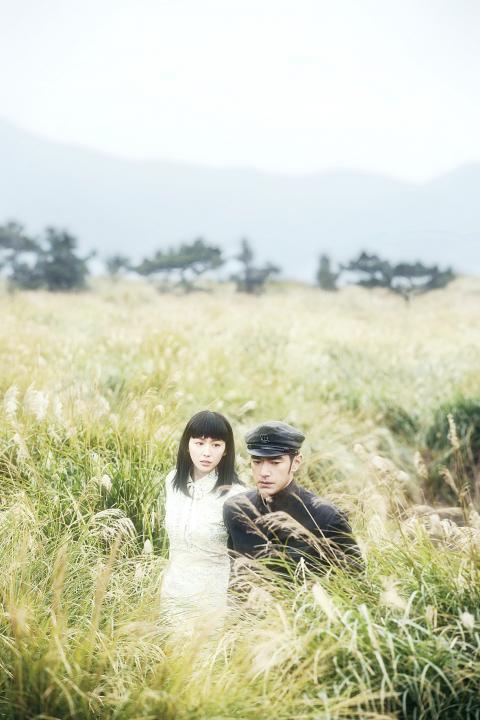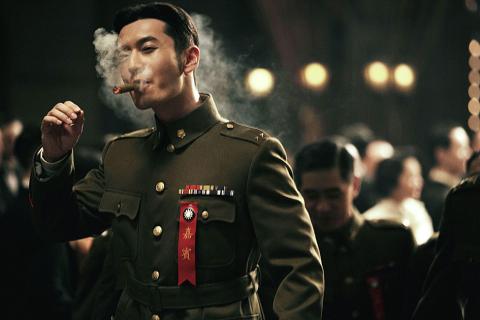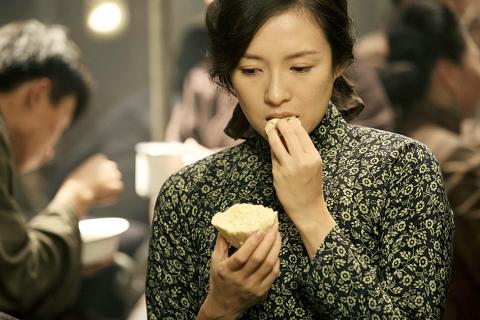Internationally renowned for his action film series A Better Tomorrow (英雄本色) and Hollywood action flicks Face/Off and Mission: Impossible 2, Hong Kong director John Woo (吳宇森) has, as of late, developed an interest in historical epics. Five years after his diptych Red Cliff (赤壁), which centers on the legendary Battle of Red Cliffs (赤壁之戰) during China’s Three Kingdoms period, Woo returns to the big screen with The Crossing I (太平輪:亂世浮生), a highly anticipated story about the modern history of Taiwan and China.
Set during the turbulent war years of the 1940s, when Chiang Kai-shek (蔣介石) and his nationalist army fled to Taiwan after losing the civil war to the communists, the NT$2 billion (US$64 million) film is sumptuously outfitted with a pan-Asian, all-star cast headed by China’s Zhang Ziyi (章子怡), Huang Xiaoming (黃曉明) and Tong Dawei (佟大為), Taiwanese-Japanese actor Takeshi Kaneshiro (金城武), Japanese actress Masami Nagasawa and Song Hye-kyo from South Korea.
Dubbed the Chinese version of Titanic, The Crossing I is an epic love story — or three, to be exact, as the film zooms in on three couples who escape China on an ill-fated ship bound for Taiwan in 1949 during the retreat of the Chinese Nationalist Party (KMT).

Photo Courtesy of Vievision Pictures
The story is based on the true story of the sinking of the Taiping, a luxury steamer that capsized after it collided with a cargo ship from Taiwan the day before Chinese New Year’s Eve. Some 1,000 crew and passengers, many of whom were KMT officials, socialites and the well-heeled lost their lives.
For this first segment, Woo takes his time to define his characters through anecdotes, and builds up the narrative tension with high drama and massive battle sequences. It opens with KMT general Lei Yifang (Huang) defeating the Japanese troops in 1945. On the battlefield, signaler Tong Daqing (Tong) captures Yan Ze-kun (Kaneshiro), a Taiwanese doctor working for the Japanese army. Returning to Shanghai after the Japanese surrender, Lei encounters Zhou Yunfen (Song), the daughter of an influential Chinese banker, during a function. It’s love at first sight. A sumptuous fairy tale wedding is subsequently held.
Meanwhile, Tong meets the poverty-stricken Yu Zhen (Zhang) on the streets of Shanghai. Yu is searching for her lover, who had been recruited by the KMT army. Their paths cross and quickly separate again, leaving Tong longing for a second encounter. But Yu is determined to find her lover but ends up working as a prostitute.

Photo Courtesy of Vievision Pictures
Released from the prisoner-of-war camp when the war ends, Yan returns to Taiwan, only to find that his Japanese girlfriend, Noriko (Nagasawa), has been repatriated to Japan. Peace doesn’t last, however, as the looming civil war soon becomes a reality. Lei sends his wife to Taiwan before departing for the frontline. Across the Taiwan Strait, Zhou has a premonition that she might never see her husband again, who is fighting the doomed battle against the Communist Chinese army.
The Crossing I is an ambitious project that weaves together three parallel and at times intersecting storylines to tell an epic tale of love and hope in a turbulent age. Supported by a top-notch technical crew, the film’s graphic battle sequences eloquently depicts the cruelty of war and serve as a counterpoint to the characters’ longing for peace. Warm and light-hearted humor balances the action and heavy drama. One fine example involves Tong’s characters and a solider from the enemy putting their guns down to share a meal.
As Woo’s oeuvre has shown, the director is adept at telling stories about brotherhood. But when it comes to romance, he’s a little out of his comfort zone. Co-written by Wang Hui-ling (王蕙玲) — Crouching Tiger, Hidden Dragon (臥虎藏龍) and Lust, Caution (色戒) — the story is noticeably uneven in its depiction of the three couples. The cliche-filled dialogue between the general and the beautiful socialite does little justice to its powerful theme; it is equally embarrassing to see the 41-year-old Kaneshiro playing a teenager bantering with his first love in the film’s flashbacks.

Photo Courtesy of Vievision Pictures
It will be interesting to see if director Woo has something more substantial to say about love and the political consequences of the historical events in the diptych’s second part, scheduled for release in Asia in May of next year.

Most heroes are remembered for the battles they fought. Taiwan’s Black Bat Squadron is remembered for flying into Chinese airspace 838 times between 1953 and 1967, and for the 148 men whose sacrifice bought the intelligence that kept Taiwan secure. Two-thirds of the squadron died carrying out missions most people wouldn’t learn about for another 40 years. The squadron lost 15 aircraft and 148 crew members over those 14 years, making it the deadliest unit in Taiwan’s military history by casualty rate. They flew at night, often at low altitudes, straight into some of the most heavily defended airspace in Asia.

Beijing’s ironic, abusive tantrums aimed at Japan since Japanese Prime Minister Sanae Takaichi publicly stated that a Taiwan contingency would be an existential crisis for Japan, have revealed for all the world to see that the People’s Republic of China (PRC) lusts after Okinawa. We all owe Takaichi a debt of thanks for getting the PRC to make that public. The PRC and its netizens, taking their cue from the Chinese Communist Party (CCP), are presenting Okinawa by mirroring the claims about Taiwan. Official PRC propaganda organs began to wax lyrical about Okinawa’s “unsettled status” beginning last month. A Global

Taiwan’s democracy is at risk. Be very alarmed. This is not a drill. The current constitutional crisis progressed slowly, then suddenly. Political tensions, partisan hostility and emotions are all running high right when cool heads and calm negotiation are most needed. Oxford defines brinkmanship as: “The art or practice of pursuing a dangerous policy to the limits of safety before stopping, especially in politics.” It says the term comes from a quote from a 1956 Cold War interview with then-American Secretary of State John Foster Dulles, when he said: ‘The ability to get to the verge without getting into the war is

Like much in the world today, theater has experienced major disruptions over the six years since COVID-19. The pandemic, the war in Ukraine and social media have created a new normal of geopolitical and information uncertainty, and the performing arts are not immune to these effects. “Ten years ago people wanted to come to the theater to engage with important issues, but now the Internet allows them to engage with those issues powerfully and immediately,” said Faith Tan, programming director of the Esplanade in Singapore, speaking last week in Japan. “One reaction to unpredictability has been a renewed emphasis on